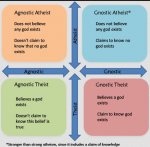Omega Man
DP Veteran
- Joined
- Nov 1, 2018
- Messages
- 3,735
- Reaction score
- 970
- Gender
- Male
- Political Leaning
- Independent
Atheism is not "just a lack of belief in gods," it is formal review of doctrine that leads to a conclusion that there is no god.
Sent from my Lenovo YT3-850F using Tapatalk
Similar to how a nihilist, in calling themselves a nihilist, and in personally identifying with and embracing aspects of nihilism, cannot claim the position that life is meaningless.
OM

